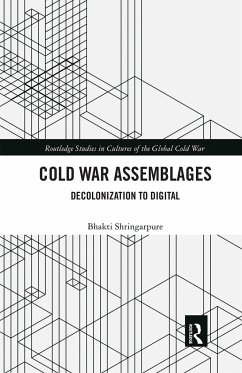This book bridges the gap between the simultaneously unfolding histories of postcoloniality and the forty-five-year ideological and geopolitical rivalry between the U.S. and the U.S.S.R. Not only did the superpowers rely upon the decolonizing world to further imperial agendas, but the postcolony itself was shaped, epistemologically and materially, by Cold War discourses, policies, narratives, and paradigms. Ruptures and appropriated trajectories in the postcolonial world can be attributed to the ways in which the Cold War became the afterlife of European colonialism. Through a speculative assemblage, this book connects the dots, deftly taking the reader from Frantz Fanon to Aaron Swartz, and from assassinations in the Third World to American multiculturalism. Whether the Cold War subverted the dream of decolonization or created a compromised cultural sphere, this book makes those rich palimpsests visible.
"Bhakti Shringarpure's book is a necessary intervention in the intellectual history of the Cold War and the postcolony. In showing that these histories cannot be separated, Shringarpure also shows how both are 'embedded in futures to come.' Anyone interested in political violence, revolutionary time, radicalism and political theory must reckon with Shringarpure's analysis."
- Sean Jacobs, The New School and "Africa is a Country"
"Shringarpure goes beneath the skin of postcolonialism and finds the Cold War. Here is the brutality of colonial violence - the harsh use of the stick, surely, but also the enforcement of starvation. Her book slips through the minds of major thinkers of decolonization, finding so much about them that has been set aside by the narrower concerns of North Atlantic postcolonial studies. This is criticism with a foot deeply sunk into the mud of the South."
- Vijay Prashad, Tricontinental: Institute for Social Research
"This is an important rethinking of postcolonial studies today. Shringarpure's provocative book underscores the urgency of bringing together studies of colonialism with studies of the Cold War, and offers a compelling methodology for doing this work. Clearly written and bold, Cold War Assemblages questions widely-touted figures and approaches from Gandhi to close reading and 'openness' in the digital realm, and offers in the place of depoliticized reading and teaching strategies a 'red thread' that ties together the US-American university landscape and culture industry with the historical and on-going impacts of colonialism and Cold War violence in the Global South."
- Kerry Bystrom, Associate Professor of English and Human Rights and Associate Dean of the College at Bard College Berlin, A Liberal Arts University
- Sean Jacobs, The New School and "Africa is a Country"
"Shringarpure goes beneath the skin of postcolonialism and finds the Cold War. Here is the brutality of colonial violence - the harsh use of the stick, surely, but also the enforcement of starvation. Her book slips through the minds of major thinkers of decolonization, finding so much about them that has been set aside by the narrower concerns of North Atlantic postcolonial studies. This is criticism with a foot deeply sunk into the mud of the South."
- Vijay Prashad, Tricontinental: Institute for Social Research
"This is an important rethinking of postcolonial studies today. Shringarpure's provocative book underscores the urgency of bringing together studies of colonialism with studies of the Cold War, and offers a compelling methodology for doing this work. Clearly written and bold, Cold War Assemblages questions widely-touted figures and approaches from Gandhi to close reading and 'openness' in the digital realm, and offers in the place of depoliticized reading and teaching strategies a 'red thread' that ties together the US-American university landscape and culture industry with the historical and on-going impacts of colonialism and Cold War violence in the Global South."
- Kerry Bystrom, Associate Professor of English and Human Rights and Associate Dean of the College at Bard College Berlin, A Liberal Arts University
"Bhakti Shringarpure's book is a necessary intervention in the intellectual history of the Cold War and the postcolony. In showing that these histories cannot be separated, Shringarpure also shows how both are 'embedded in futures to come.' Anyone interested in political violence, revolutionary time, radicalism and political theory must reckon with Shringarpure's analysis."
- Sean Jacobs, The New School and "Africa is a Country"
"Shringarpure goes beneath the skin of postcolonialism and finds the Cold War. Here is the brutality of colonial violence - the harsh use of the stick, surely, but also the enforcement of starvation. Her book slips through the minds of major thinkers of decolonization, finding so much about them that has been set aside by the narrower concerns of North Atlantic postcolonial studies. This is criticism with a foot deeply sunk into the mud of the South."
- Vijay Prashad, Tricontinental: Institute for Social Research
"This is an important rethinking of postcolonial studies today. Shringarpure's provocative book underscores the urgency of bringing together studies of colonialism with studies of the Cold War, and offers a compelling methodology for doing this work. Clearly written and bold, Cold War Assemblages questions widely-touted figures and approaches from Gandhi to close reading and 'openness' in the digital realm, and offers in the place of depoliticized reading and teaching strategies a 'red thread' that ties together the US-American university landscape and culture industry with the historical and on-going impacts of colonialism and Cold War violence in the Global South."
- Kerry Bystrom, Associate Professor of English and Human Rights and Associate Dean of the College at Bard College Berlin, A Liberal Arts University
- Sean Jacobs, The New School and "Africa is a Country"
"Shringarpure goes beneath the skin of postcolonialism and finds the Cold War. Here is the brutality of colonial violence - the harsh use of the stick, surely, but also the enforcement of starvation. Her book slips through the minds of major thinkers of decolonization, finding so much about them that has been set aside by the narrower concerns of North Atlantic postcolonial studies. This is criticism with a foot deeply sunk into the mud of the South."
- Vijay Prashad, Tricontinental: Institute for Social Research
"This is an important rethinking of postcolonial studies today. Shringarpure's provocative book underscores the urgency of bringing together studies of colonialism with studies of the Cold War, and offers a compelling methodology for doing this work. Clearly written and bold, Cold War Assemblages questions widely-touted figures and approaches from Gandhi to close reading and 'openness' in the digital realm, and offers in the place of depoliticized reading and teaching strategies a 'red thread' that ties together the US-American university landscape and culture industry with the historical and on-going impacts of colonialism and Cold War violence in the Global South."
- Kerry Bystrom, Associate Professor of English and Human Rights and Associate Dean of the College at Bard College Berlin, A Liberal Arts University








